- Home
- Lauren Oliver
The Spindlers Page 13
The Spindlers Read online
Page 13
“No, I am!” A fifth Patrick appeared.
“No, I am!” And a sixth.
More and more Patricks appeared in more and more mirrors—until the hall was full of them, and filled with the clamorous sounds of shouting as they hurled accusations at one another and begged Liza to open their door, the real door.
Liza’s head was full of buzzing, and she was dizzier than ever. She walked back and forth between the rows of mirrors, panic welling inside her. She had no doubt that behind most of these doors some horrible evil was lying in wait. The queen of the spindlers would have made sure of that.
“Liza, over here!”
“Liza, over here!”
One of these doors must lead to the last room. But all the Patricks looked the same to her: They were dressed in the same ratty corduroys with the frayed cuffs, and the same faded BROOKLYN T-shirt, and the same red Chuck Taylors, just how the real Patrick would dress. And each of them pouted and shouted and snorted and stamped like the real Patrick did when he was throwing a tantrum.
“Don’t listen to any of them, Liza! Open my door!”
“No! Open mine!”
“Stop it!” Liza gritted her teeth and clamped her hands over her ears. She couldn’t think; the voices and the shouting were too loud. If they would only be quiet …
“There’s a nest of hornets the size of softballs behind his door—”
“He’s a liar, Liza! Come on! You can tell just by listening to him.”
“Shut up!” Liza cried. “Shut up and let me think for a minute!”
But the Patricks did not shut up. If anything, their shouting grew louder, until the room echoed with voices and the stalactites trembled from the ceiling, and the water in the puddles was full of ripple and vibration. And it was just like the real Patrick not to listen, and do the exact reverse of what you wanted him to do.
“Liza!”
“Liza!”
“Liza!”
Liza’s anger peaked, and she lashed out in frustration, driving her fist against the nearest mirror.
“I said shut up!” she cried; and felt a sharp ribbon of pain shoot from her hand all the way up her arm as she connected with the glass. A dark trickle of blood ran between her fingers, and she brought her hand quickly to her mouth. A web of fissures had appeared in the mirror, splintering Patrick’s image into a hundred pieces. Still, he continued shouting at her, his mouth now a hundred mouths.
All the Patricks continued shouting at her.
All of them, that is, but one.
She had seen him out of the corner of her eye as her hand had cracked the glass. He had reached for her quickly, instinctively. And now he asked her, “Are you okay?”
Liza, no longer unsure, walked directly to the mirrored door in which the real Patrick was reflected, as all around her the clamor and shouting continued. Then she put both hands against the mirror and pushed; and she passed through, into the third and final room.
Chapter 20
THE FINAL TEST
Once again Liza felt instantly disoriented; she appeared to have walked straight into a forest. The ground was carpeted in thick green moss, and large trees formed a vaulted ceiling over her head.
All around her were silver and gold flowers with blossoms the shape of tiny trumpets; the air smelled sweet and was full of birdsong. It was the most beautiful place Liza had ever seen. She heard laughter coming from somewhere beyond the trees; and she had just started to move toward the sound when a girl stepped out of the woods. As soon as she saw Liza, her face lit up.
“Liza!” the girl said, and broke into a run. “I’m so glad you made it!” She seized both of Liza’s hands in her own.
“I—I’m sorry,” Liza said, feeling suddenly shy. “I don’t think I know you.”
The girl was the prettiest person Liza had ever seen, and seemed to match perfectly with the beauty of her surroundings. She was older—she must have been Anna’s age, Liza thought, and in fact she kind of looked like Anna, except that instead of wearing jeans with dirty cuffs and an old band T-shirt as Anna usually did, this girl was wearing a dress that seemed to be made entirely of leaves and petals. But she had Anna’s long blond hair and straight white teeth.
The main difference in their looks, Liza saw, was in the eyes: Anna had hazel eyes, while this girl’s were the vivid green of the thick moss that grew beneath her bare feet.
The girl laughed. Her laughter reminded Liza of bells ringing on a clear day. “Don’t be silly,” she said. “Don’t tell me you don’t know your own sister.”
“Sister?” Liza croaked out.
“Forever sister,” the girl said happily, as she began tugging Liza forward into the trees. “The others didn’t think you would make it. Of course, I knew you would. I hoped you would, at least. And you did! We’ll have a party; we’ll get cupcakes. Do you like cupcakes? Of course you do....”
“Wait,” Liza said. “You don’t understand. I don’t have very much time—”
The girl cut her off with another tinkling laugh. “Time is all we have!” she said. “There’s loads and loads of it here.”
They emerged into a clearing. A large table was set up underneath a white silken canopy, which was hung all over with twinkling lights. The clearing was carpeted with tiny flowers of all different colors, and Liza’s bare feet sank into the soft petals as she walked.
There was something familiar about the table in the clearing, although it took Liza a moment to realize what it was. Then she got it: The table looked very much like the kitchen table at home, and had four chairs just as her table did, although everything here was larger and grander. There was, for example, no stack of coasters wedged under the second table leg, to keep it from wobbling; and none of the plates were webbed with cracks, as they were at home.
There were three people sitting at the table, feasting on food served from enormous platters: a man, with gray hair and kind-looking eyes; across from him, laughing, a woman, with the older girl’s long blond hair and a cape of flowers draped over her shoulders; a boy, probably Patrick’s age, with red cheeks, a crown of golden curls, and wide, smiling eyes.
All three of them turned as Liza entered the clearing, and even though they nodded and smiled welcomingly, Liza hung back, feeling shy again.
“She’s here!” the-girl-who-looked-like-Anna said triumphantly. “Didn’t I say she would come?”
“Welcome home, Liza,” the woman said. She was as beautiful as her daughter: Warmth seemed to emanate from her eyes, filling Liza with a bubbly happiness from her toes to her head.
“This—this isn’t home,” Liza stuttered.
“Of course it is,” the older woman said, laughing. “It’s your new home. We’ve been waiting for you! And now everything is just as it should be at last.”
“Exactly so,” said the gray-haired man heartily. “From now on there will be nothing but happiness!”
“And games,” the little boy with the smiling eyes put in.
“And parties,” the-girl-who-looked-like-Anna said, squeezing Liza’s hand excitedly. “And laughter all the time!”
“And love, of course,” added the older woman gently. “We will always love one another.”
“Let’s toast!” said the man. He lifted his glass.
“Come on, Liza,” said the-girl-who-looked-like-Anna. “Sit and toast with us.”
The bubbly feeling had made all the pain and fear of Liza’s journey underground begin to unloosen, and she was desperately tempted to sit down. But she could not forget about Patrick—not when she had come this far.
She said, with some regret in her voice, “I can’t. I must find Patrick. I must rescue my brother.” Seeing the gray-haired man frown, she quickly added, “But maybe on the way back? Patrick would like it here too. He loves games.”
“That won’t do,” said the gray-haired man, with a shake of his head.
“Not at all,” his wife trilled.
The-girl-who-looked-like-Anna slipped an arm arou
nd Liza’s shoulders. Her skin smelled sweet, like honeysuckle and raspberry.
“I don’t understand,” she said, in her sweetest voice. “Don’t you want to stay here and be sisters?”
“Yes,” Liza answered truthfully.
“And don’t you want to be happy forever?” the-girl-who-looked-like-Anna asked.
“Yes,” Liza said. “Of course.”
“Then you must forget about Patrick,” the girl crooned, and she once again drew Liza to the table. “You must forget about everything that came before, and sit and eat with us; and then you will have everything you’ve ever wanted, and you and I will spend all of forever never growing up, and being beautiful and young and loved and happy.”
Liza looked at the four smiling faces at the table, perfectly happy, perfectly harmonious, like four well-sounded notes on a piano. She swallowed hard.
“But—” she said. “But I can’t stay here forever. I have to return Above.”
“Above!” the-girl-who-looked-like-Anna scoffed, and even the way she pronounced the word made it sound small and dirty and unappealing, like a tiny room with no windows. “What could you possibly want from Above?”
Suddenly Liza had a hard time remembering. She thought of her own kitchen table; she thought of her father’s distracted mutterings and the sound of her mother pacing, pacing back and forth. She stammered out, “My mom and dad are Above. If I stay here, they’ll worry about me.”
“Will they?” the older woman asked, arching an eyebrow.
“Are you sure about that?” The gray-haired man smiled widely.
“And are they always happy?” the-girl-who-looked-like-Anna said. “And do they always love you?”
Liza thought of the exclamation point between her mother’s eyebrows, and her mother telling her to be a good girl and act your age, and stay quiet so Mommy can think; and her father, who worked all the time and then came home too tired to talk or play. She drew the chair out a little farther from the table so that she could sit down.
“She sits!” cried the gray-haired man.
“Hooray for Liza!” the boy said, bouncing in his seat.
“My lovely girl!” said the older woman.
“My forever sister!” the-girl-who-was-even-prettier-than-Anna said, her eyes flashing an almost electric green.
Liza froze just as she was about to lower herself into the chair. Just that—that momentary flash of green in the girl’s eyes—had reminded her of the spindlers’ eyes watching her from the dark. She thought, too, of the scawgs; they also had laid a feast for her. With a tremendous effort, she wrenched her hand from the chair and took one step away from the table.
“You are not real,” she said, and the words, too, took a great effort.
The gray-haired man laughed, but to Liza’s ears, his laughter sounded forced. “What do you mean?”
“The table, the birds, the forest—” Liza pointed to each thing in turn. “None of it is real.”
“Liza.” The-girl-who-looked-like-Anna came and gripped Liza tightly by the shoulders. “Liza, listen to me. I will be your bravest, brightest, most lovingest sister. Don’t you want to stay with me?”
Her words tugged at Liza’s soul, drawing her back to the table. It took all her strength to resist. “I can’t,” she said.
The girl released Liza’s shoulders abruptly. “There is nothing for you Above,” she said angrily. “Nothing but dullness and drudgery, and homework and fighting, and mashed peas and people who won’t give you what you want. Here everything is perfect, and you will always have everything exactly to your liking, and you will always be happy.”
Her voice was a thick syrup in Liza’s brain. It was so hard to think. But she fought her way through it. “It’s no big trick to be happy when everything is perfect,” she said slowly. “And it isn’t brave, either. Anyone can do that.”
“And what does it matter what is real and what isn’t?” the-girl-who-looked-like-Anna said, her voice rising hysterically. “You believe in us, and that is real enough.”
But it was too late. Liza had taken another step away from the table, and another. And as she did the gray-haired man, the beautiful older woman, the boy, and the Anna-who-was-not-really-Anna—all of them seemed to grow fuzzier, blurrier, like a TV image fading away into static.
“Yes, but Patrick believes in me,” she said. “And that is very real.”
The almost-Anna let out a mangled cry and ran at Liza, arms outstretched, her eyes growing to huge half crescents: spindler eyes. Liza felt a tremendous rush of air, a current blowing all around her, and suddenly the woods were full of shrieking, and all the birds took off into the sky at once, a swollen black cloud, and Liza felt as though she would be sucked up into the hurricane of noise and tearing. She was terrified, and so she closed her eyes and listed all the things she knew to be real and true, loudly, over the wind and the roaring:
“Mom likes rye toast in the morning. Dad takes his coffee without milk. Patrick does not like the feeling of wet feet on the grass and must have his sandals lined up next to the pool. My favorite color is red. On the bedside table are three purple hair clips, given to me by Aunt Elizabeth.”
The roaring noise around her reached a crescendo, and Liza felt icy hands gripping her wrists, nearly pulling her off her feet.
She yelled out, “Summer comes after spring, and autumn comes after summer, and after winter, spring will come again.”
Suddenly the noise fell away completely. Liza cracked one eye open, and then the other.
She was standing in a perfectly plain white room, completely silent, completely bare. The forest, the trees, the table—all of it was gone. There was a plain wooden door set in one wall.
Liza walked across the room and opened it, and so she left the third and final room, and at last she reached her brother in the Web of Souls.
Chapter 21
THE WEB
Liza stood in a vast, dark space in front of a web the size of a towering building; it stretched up and up and up into the mist and the gloom, trembling slightly in the cool, dank currents of air that swirled through the cavern.
The web was spun with silver thread that glinted and glittered and seemed to give off its own, cold light.
Up and up and up: loops and curlicues, spun silken strands.
She took one step toward the web, and then another. It reminded her of being very small and going with her parents to New York City: the terrible towers of metal and glass! The rivers and waterfalls of concrete! The enormous tongues of stone and brick, wagging from the sky, as though ready to swallow you.
The Web of Souls was like that, but bigger and more terrible.
And what made it most terrible—beautiful and frightening all at once—were the souls, the hundreds and hundreds of souls, glowing and pulsing among its sticky strands. She knew that was what they were, immediately and without question, although the souls did not look exactly as she had imagined they would.
They were colored, first of all. Each soul was wrapped in a cocoon of silver thread, which bound it tightly to the web: But even so, the colors showed through, faintly, a haze of different hues. Some souls glowed bright orange, others were the shade of dusky twilight, others were a pure blue, others shone in colors Liza did not have a name for, so the whole effect of standing before the Web of Souls was like staring up at the world’s largest Christmas tree.
The second surprising thing was their size. They were small. Even the largest was no bigger than a softball, and some were closer to the size of a Ping-Pong ball or smaller.
And yet, out of all the hundreds of souls that Liza could see—so many, Liza did not see how she could possibly carry all of them Above—she recognized Patrick’s soul right away. She did not even have to think about it. She just knew.
(How do you explain this? It is a great mystery, and one that the lumer-lumpen might perhaps know how to answer. But the lumpen are not speaking, so a mystery it will no doubt remain.)
Patrick’s sou
l was about the size of a lumpy softball, and it was for the most part a comforting maroon color, like the color of the well-worn fleece blanket at the foot of Liza’s bed, although in tiny places it appeared much closer to a fire-engine red, and in others a deep ink-purple. It was hanging just off to Liza’s left, a little bit higher than eye level, and as she approached it a great feeling of relief and joy swept through her. For the first time since coming Below, she let a single tear fall to the ground.
“Hi, Patrick,” she whispered, and it seemed to her that just for a moment the soul flared slightly brighter. “I’m here to take you home.”
That was when the ground underneath her gave a gigantic heave.
Liza stumbled, cried out, and unconsciously grabbed the web to steady herself. Pain ripped through her palm, and she withdrew her hand quickly. The strands of the web were hard, and hot, and very sharp, like razor wire. There was now a long, thin cut across Liza’s palm, dotted with bright red beads of blood.
Fear yawned open inside her as the ground continued to buckle and roll, as though the whole underworld was a wet dog trying to shake itself dry. Across the cavern, an enormous stone came crashing down from the ceiling, splintering to pieces and sending another shudder through the ground. It made Liza’s teeth rattle in her head. Her heart was a constant hum, a tremor....
And then she felt it, beating there under her heart: the black brush-tip of wings.
Hello, said her nocturna, quite calmly, and for a moment she saw its wise black eyes hovering in front of her face.
“You found me!” Liza was so relieved, she nearly let another tear fall.
Of course I found you. I told you I would be watching.
But how?
I am always with you, Liza.
The ground heaved enormously, sending Liza tumbling, hard, onto her backside. “What’s happening?” she cried out.
Listen to me, Liza. There isn’t much time.
Another rock, the size of a boulder, came hurtling down from above; Liza watched in horror as it took out a whole portion of the web, burying a dozen souls in rubble and debris. More rocks came raining down; the cavern was filling with a gray, choking dust.

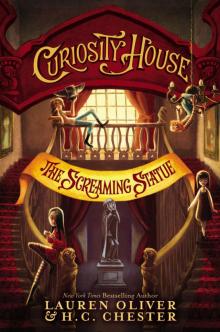 The Screaming Statue
The Screaming Statue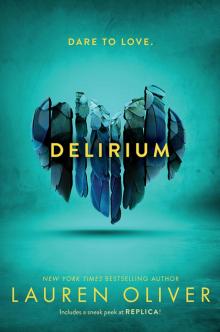 Delirium
Delirium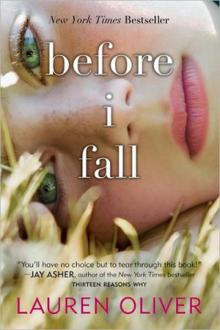 Before I Fall
Before I Fall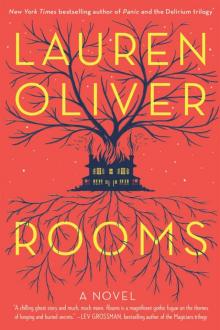 Rooms
Rooms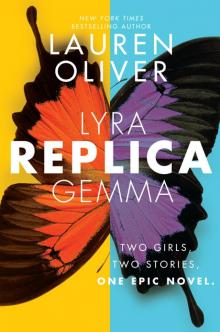 Replica
Replica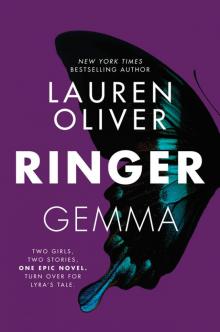 Ringer
Ringer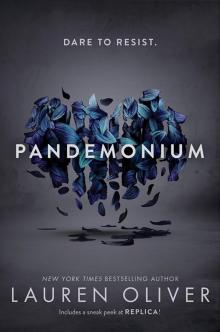 Pandemonium
Pandemonium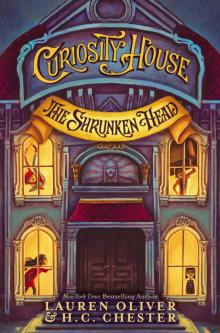 The Shrunken Head
The Shrunken Head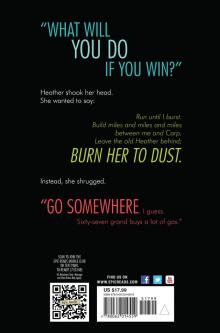 Panic
Panic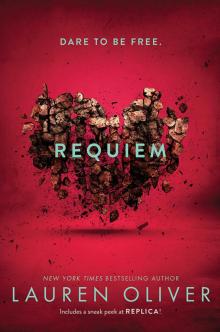 Requiem
Requiem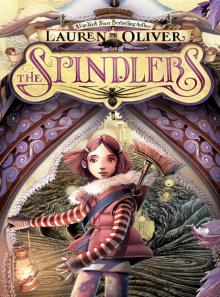 The Spindlers
The Spindlers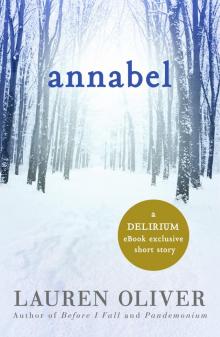 Annabel
Annabel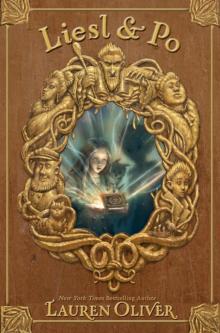 Liesl & Po
Liesl & Po Raven
Raven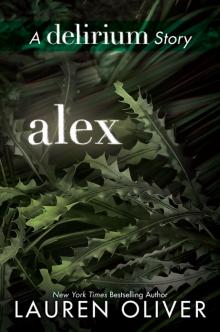 Alex
Alex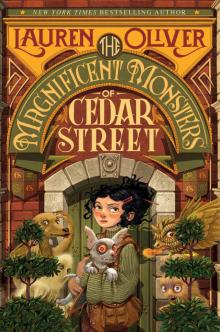 The Magnificent Monsters of Cedar Street
The Magnificent Monsters of Cedar Street Vanishing Girls
Vanishing Girls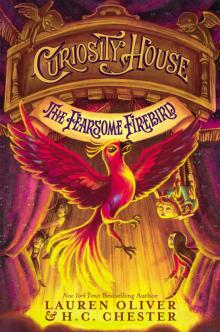 The Fearsome Firebird
The Fearsome Firebird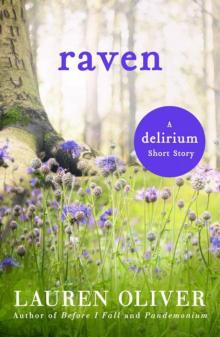 Raven: A Delirium Short Story
Raven: A Delirium Short Story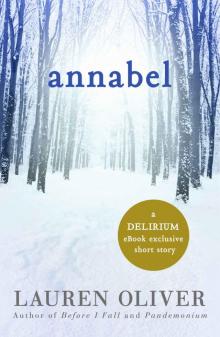 Annabel: A Delirium Short Story
Annabel: A Delirium Short Story Hana: A Delirium Short Story
Hana: A Delirium Short Story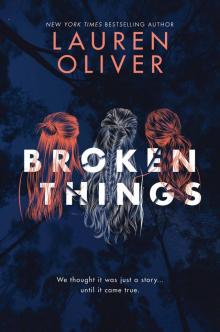 Broken Things
Broken Things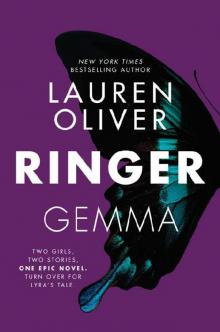 Ringer (Replica)
Ringer (Replica) Alex (delirium)
Alex (delirium)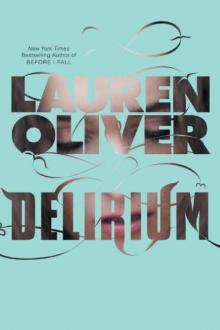 Delirium dt-1
Delirium dt-1